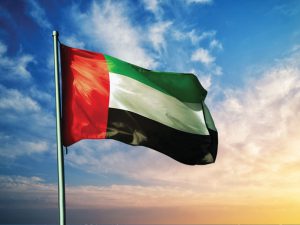RIYADH/WAM
Suhail bin Mohammed Al Mazrouei, Minister of Energy and Infrastructure, presided over an official UAE delegation that participated in the Global Logistics Forum 2024, hosted by the Saudi Ministry of Transport and Logistics Services under the esteemed patronage of the Custodian of the Two Holy Mosques, King Salman bin Abdulaziz Al Saud. Held from October 12 to 14 at the King Abdullah Financial District, the landmark event aimed to foster international collaboration and reshape the global trade and supply chain landscape.
Al Mazrouei attended the Ministerial Diwan, which drew the participation of several ministers. He thanked Saudi Arabia for its steadfast support to the logistics sector and noted that such events represented a genuine opportunity to exchange ideas and experiences, learn from world-class experiences, and create economic and investment opportunities.
Moreover, Al Mazrouei participated in a ministerial session alongside Saleh bin Nasser Aljasser, Minister of Transport and Logistic Services of KSA; Khalid Al-Falih, Minister of Investment of KSA; Lieutenant-General Kamel Al-Wazir, Minister of Transport of Egypt; and Saeed bin Hamoud Al Mawali, Minister of Transport, Communications, and Information Technology of Oman.
The Minister of Energy and Infrastructure underscored that regional and international collaboration is key to improving connectivity, diversifying logistics supply chains, and developing international transport routes.
He said, “The UAE continues enhancing its position as a global leader in offering logistics services, greatly leveraging its advanced infrastructure and strategic location. The UAE government recognises the importance of enhancing connectivity with international markets to help the sector grow and become more sustainable. In this context, the UAE has invested in railways in Oman and Jordan. In addition, the UAE has invested in the logistics infrastructure of over 78 countries and operates 112 ports worldwide.”
Reflecting on the UAE’s performance in global competitiveness indicators, Al Mazrouei said, “In 2023, the UAE ranked 7th globally in logistics performance, 1st globally in air transport infrastructure quality, 3rd globally in facilitating sea-transported trade, 3rd globally in ships’ refuelling, 3rd globally in air transport efficiency, 5th globally in maritime centres, 5th globally and 1st in the Arab region in road quality, 9th globally in seaports efficiency, 12th globally in maritime transport indicator, 13th globally in maritime connection indicator, and 13th globally in navigation lines indicator.”
He added, “The UAE is committed to making global logistics more efficient with technology. It is one of the first countries to use maritime single windows. Moreover, Abu Dhabi Ports has launched blockchain technology in its operations. The UAE also launched the Blue Pass Multimodal – a unified digital portal that designs main pathways for the integration and acceleration of multi-modal shipping. After the success of the Blue Pass initiative in the maritime sector, we expanded it to air and land shipping. Currently, over 300 companies are registered in the portal, offering services to over 25,000 ships.”
The minister noted that the UAE seeks to tackle energy and climate costs of logistics by adopting alternative energy sources for transportation and implementing emission reduction initiatives. In this context, the country launched the Global EV Market project, which aims to increase the number of electric and hybrid vehicles in the UAE to 3.6 million by 2050 – 50 percent of total registered vehicles. It also revealed the General Policy for Sustainable Aviation Fuel that aims to encourage the production and use of sustainable aviation fuel. Its targets include enhancing sustainable aviation fuel production capacity to 700 million litres annually by 2030, alongside scaling up production rates to meet the growing demands of the aviation sector. In addition, the country established the 1st Maritime Decarbonisation Centre in the MENA region and the 4th globally. The Centre serves as a knowledge hub, facilitating global collaboration in developing maritime decarbonisation solutions.
Al Mazrouei continued, “The UAE has 12 commercial seaports, in addition to oil ports, and 310 berths with a capacity of 80 million tonnes of goods. In 2023, over 24 million standard containers were handled from 25,000 ships that called on the UAE’s ports. Moreover, the UAE operates six national carriers that run flights to 224 global destinations. In 2023, air freight amounted to 3.7 million tonnes. As for land transport, it has established an advanced road network that has 925 km of federal roads and 1,200 km of railway.”
On the sidelines of the Global Logistics Forum 2024, Al Mazrouei held a bilateral meeting with Saleh bin Nasser Aljasser. They discussed ways to boost collaboration in transport and logistics between the UAE and KSA, reaffirming the importance of building on the strategic partnership between the two countries to improve the efficiency and integration of the transport and logistics sectors.
The delegation included Sheikh Nahyan bin Saif Al Nahyan, UAE Ambassador to Saudi Arabia; Hessa Al Malek, Adviser to the Minister for Maritime Transport Affairs at the Ministry of Energy and Infrastructure (MoEI); and a number of officials from MoEI and other stakeholders.
 The Gulf Time Newspaper One of the finest business newspapers in the UAE brought to you by our professional writers and editors.
The Gulf Time Newspaper One of the finest business newspapers in the UAE brought to you by our professional writers and editors.
